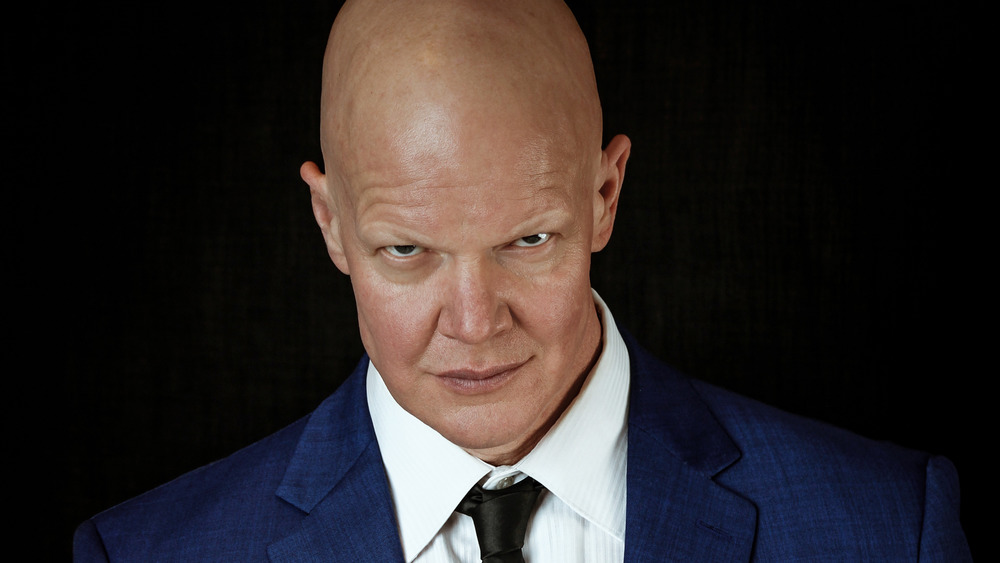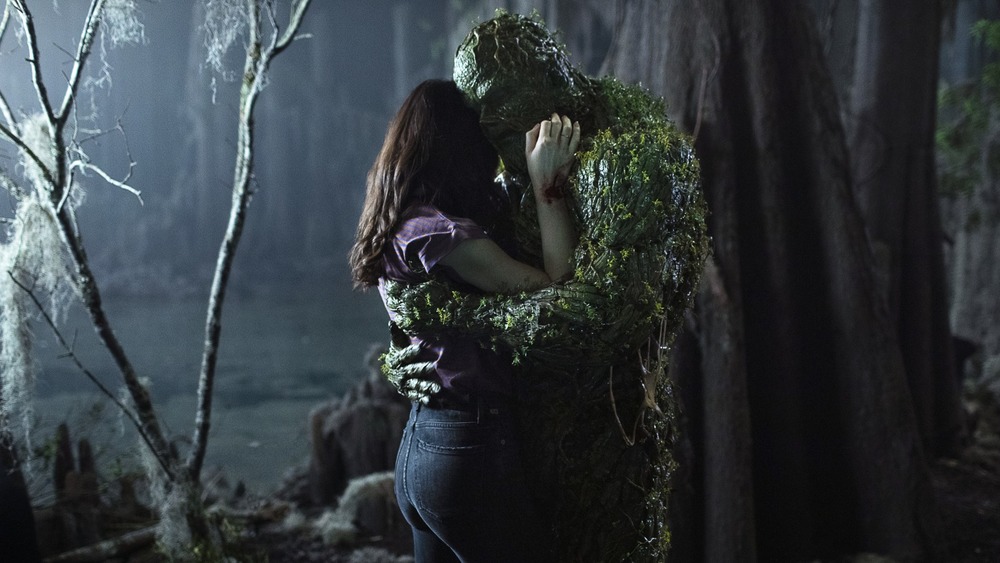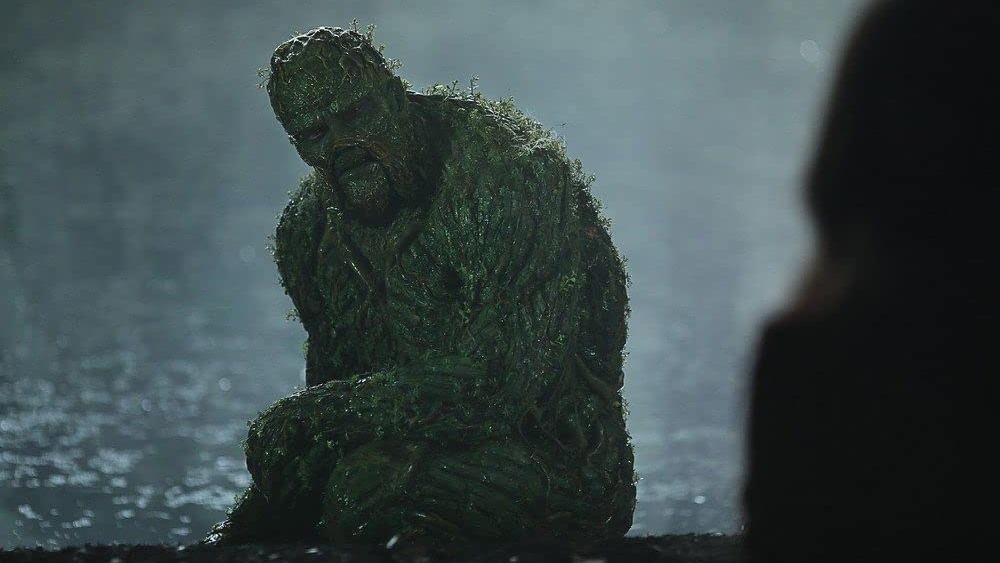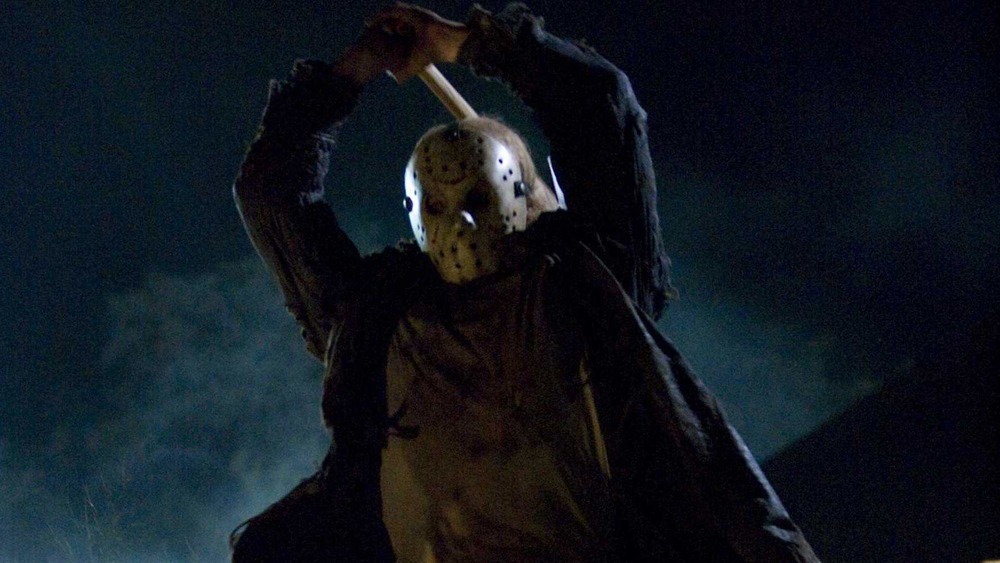Swamp Thing Star Derek Mears On Embodying The Role, Playing Jason, And More - Exclusive Interview
You may not recognize Derek Mears on sight, but you've almost certainly seen his work. After launching his career as a stuntman, and embodying various creatures on the big and small screen for projects like Zathura, Cursed, Pirates of the Caribbean: Dead Man's Chest and more, Mears has moved on to progressively bigger roles, and along the way he's played some genuine screen icons. In 2009, he joined the distinguished fraternity of actors who've donned hockey masks to play Jason Voorhees, embodying the character for the Friday the 13th reboot, and since then he's done everything from playing Krampus on an episode of Grimm to playing a Cyclops in the Percy Jackson films.
In 2019, Mears got the chance to embody another pop culture icon when he was cast as the title character in the DC Universe streaming series Swamp Thing. As with many of his roles, you might not recognize Mears underneath that big green suit, but the role of Swamp Thing called for much more than wearing a costume. In a wide-ranging chat with Looper, Mears discussed what it was like to embody the character, how he came to empathize with Jason, and what he hopes viewers will take from Swamp Thing now that it's getting a new audience on the CW.
Finding comfort in the Swamp
It feels like a big deal that the show is getting this extra shot on terrestrial television, on the CW. How do you feel about getting to see the show out there on a different network?
I'm actually extremely excited about it. One for the content, but two for the hard work that the artists in different mediums, cast and crew work on the show, to see their work to a bigger audience. That sounds amazing to me, but also, especially now during this pandemic, and all of the craziness and uncertainty that's ahead of us. To give the audience a taste of entertainment that is exciting, but also comforting in a sense to let us know that it's okay to be different. So I'm very excited about that.
Swamp Thing, when it first came out, it was 2019. It feels like that was 10 billion years ago.
It does, right? I literally prepared for all of the interviews today, I'm like, "Well, what's it like?" I had to remember. That was a gift, "Oh, that's when we could go outside and touch people and eat wherever we wanted to. And people smiled at each other. Great." Different times.
It's interesting to think about it now, this a show that's about a lot of things, but that starts with this town beset by a mystery disease. What is your hope now, this is a show that obviously a ton of big fans have already seen a year ago, but now these people are going to see it for the first time, a lot of folks. What are you hoping that they're going to get out of it in this time that we're in?
Honestly, comfort. I hope it gives them an escape from whatever it is that they're currently dealing with, whatever stress because of the pandemic. And if it can help people escape just for a few minutes, that would make me very happy because the character itself is so complex and the humanity that we're exploring, or lack of. I think that resonates with so many people and people are going to really relate to it no matter what they're facing. And ultimately, to let people know that it's going to be okay.
What do you find to be comforting about the show?
I think it's that existential crisis that Swamp Thing is dealing with when he explores what we are, what's humanity about. And humanity in the show, it gives us not just the stereotypical black and white, but there's so much gray. An analogy I guess would be, if who you are as a human is a bunch of clay, who do you want to become, how do you mold that to be you? And also on the terrifying side of it, if everything that you know, that you identify with to address yourself or identify with as yourself that is you, what if that's all taken away? And it brings up so many different questions. So I guess in a sense also with Swamp Thing it's like one of those rock songs where you don't want to tell somebody what it's really about, but let them interpret it for themselves and find out what that meaning is to them.
If Swamp Thing was a rock song, what rock song is it?
There's different aspects at different times. My improv background, immediately my brain went to Alice in Chains, "Down in a Hole."
Living in the Swamp Thing suit
What was it like being in that suit, being in all the prosthetics, and playing that character? What was the experience of that like when you're working, did it stay with you when you were done with the day?
This is a dynamic question, this is fantastic. I'll tell you a personal story. There is one point where I'm working on the show, and my wife is in Los Angeles and I'm filming in Wilmington, North Carolina. And she calls me, checking in and seeing how I'm doing and it's the day I'm not working. And she's like, "Well, how are you holding up? What's happening?" And I'm like, "Honestly, I'm physically just exhausted because of the complexities of the suit and you're stuck inside it for so long in the heat." And you also hit emotional beats it amplifies, your body doesn't know the difference if it's real or not when you're acting because your body takes it the same. So that emotional stress. And so I go, "So I'm very physically tired, but I just feel manic or I feel like I'm just falling through blackness, just reaching out, trying to grab a branch of something that's familiar and stable just to get a breath or a handhold."
And then all of a sudden my wife starts laughing. I'm like, "What? I'm very in my heart and she's laughing?" I'm like, "What's so funny?" She said, "Sweetheart, you realize that you've been manic day after day after day playing the character and the character is starting to seep into your own life. That's what your character is expressing and dealing with currently." And I went, "Oh man, I'm normally the guy telling other acting friends that that's going on." I'm like, "I'm so close to it that I don't see that happening. Yeah, you're right. You're totally right."
But the suit is so freaking amazing. I've worn a lot of different prosthetics over my career and this is really like the Cadillac of prosthetic suits. It is difficult, but it's the best that it could possibly be. And seeing the way that you can express an emotion through the makeup, I have talked to Fractured FX who created the suit because at any time when I'm looking in the mirror, suiting up to go to sets, was I ever over it? I'm constantly finding something new and playing in the mirror like a giant child, it's just so much fun. And the other aspect of the thing you're asking about, about playing Swamp Thing or the character, I really learned something on the show. Where I've been fortunate in my career, I've played different iconic characters that existed before me and me being a giant nerd, "I get to play what? This is amazing." But I really learned with this character that when you're dealing with an iconic character, that everyone has different histories with in the past that before, when you're doing your research.
A lot of times you draw the research from the creators, like Len Wein and Bernie Wrightson, the artists, and every different medium that has ever been experienced had experienced Swamp Thing. Like with Wes Craven's films, or the cartoon, or the TV show. So you would have all those to go with and the original comics, but the new factor that I found in was when I got cast as the character I got on my social media, [I got] a lot of messages from fans saying, "Oh, you're the right guy. This is what Swamp Thing means to me." And everyone would share their own personal stories where it was like, "Swamp Thing was the movie or the TV show that I watched with my father, who passed away. So it reminded me so much of my relationship with my father." Somebody else was of a different gender saying like, "Oh, I really relate to a Swamp Thing where I'm in this body and understanding what I am through the character of being in the crisis of the teacher. And what I feel about myself."
And I really got to thinking, "Wow, not just the artists, but also at the fans, we have our own stories tied to Swamp Thing." And it's out there in that mythos, so my responsibility is I'm the caretaker of those memories. And my job is to A, have my own artistic interpretation of what those are, but also to have that care for, I know I'm not going to be the last guy to play Swamp Thing in the future because he's such an iconic character. So it's to keep that, the game of don't let the feather hit the ground, keep that feather off the ground for Swamp Thing. It's for the next person to come in because you don't want to disparage or disrespect anybody's memories that they've had with their current relationships. So I'm borrowing their own relationship with Swamp Thing and trying to put him onscreen in the best way to represent him I possibly can.
I watched a number of interviews that you gave and you talked about some of the improvisational stuff, that Chekhovian approach. When you were sitting there on the day and figuring out what the alterations were going to be, and how to get that right, whether it meant sticking exactly to the script as it was or making minor alterations, what is that relationship like actor to actor? Or working with the directors, working with other people on set, to get that right? What were you doing?
Well, I'm very lucky because my background, I've been doing improv comedy for over 17 years. I've been doing it for such a long time that I'm able to adjust to... Each time I'm working with a different actor, everybody has their own processes, and how they want to operate, and what they need to get their art done, same thing with directors. When we have different directors come in, some might be very visual. Some might be very subtextual, some might be straight word-for-word, for what is going on. So having to adapt to each director and other artists was a challenge, but also it was so liberating because everyone respected each other so much. Everyone is trying to make this giant cake and everyone's adding their own amount of spice, but they're only in charge of that certain spice.
So it was never an ego sense where people would throw in and go, "Oh, this is what I'm doing. I'm this, I'm amazing. Do you know who I am?" It was very much in the sense of, we're going to make the best Swamp Thing cake possible. "What are you putting into your sugar? How much sugar? Okay, what if I put a little bit of this cream to go with the sugar and then the person who's doing the flour will add this amount if they want to, it's up to them." So it was a very free form or creative environment that was celebrated and it's very rare on TV shows, where it didn't matter if you were in front of the camera or behind the camera. Everybody treated each other with such respect and appreciated what they brought to the table — it was one of the best experiences I've ever had in front of a camera.
Playing Jason and Swamp Thing's second life
Do you think there's a shot that you'd get a chance to play Swamp Thing again, if not somehow on more Swamp Thing the show, then like how Matt Ryan did with Constantine on DC's Legends of Tomorrow? Do you think that there's a shot for you to keep playing this role in that CW Arrowverse that they've got?
I really have zero expectations with what's going to become of the character if I get to play the character again. The one thing that I'm taking away from all of this is I got to create this particular season with my friends and I'm very proud of what we accomplished as a team. I don't know in the future, there's so many moving parts to it because I'm not Swamp Thing. We're all Swamp Thing, all the people who created the show, because we all added our talents to it. So depending on if, say, he would've gone like a Matt Ryan, to do something different by himself, it really depends on the artistic creators who are involved in it. So I really don't know. I'm open to it but honestly, that's a bigger mystery than the mystery in the swamp.
One of the great things about Swamp Thing is the empathy that he engenders. Now, I want to see if there's a way that we can apply that to another character that you played, who perhaps people might struggle having empathy for. His name is Jason Voorhees, you might've heard of him. He's a really interesting guy but finding the empathy for him is not an easy thing to do. But let's say hypothetically somebody, you, played Jason Voorhees, you might, as somebody who gets really deep into the craft, have empathy for him and look at him in a way that other people might not. And that's what I'm looking for from you, that's what I'm curious about.
Oh man, yeah, absolutely. In any character that I do, I really want to find the humanity and bring the humanity forth in that character. Not to sound actory, but really that's the relationship that we all can... A starting point to the relationship with that character to an audience member, because we all can relate to that. We know what it's like to be human, we know what it's like to not be perfect. For myself, for Jason, one of the things that helped me tie into him was I grew up with alopecia. And alopecia, for people who don't know, is a disorder where your hair falls out and it fell out when I was very young, like 11 years old. And at the time it wasn't cool to be bald and a white kid and people would think, "Oh, you're an Aryan," or, "You have cancer." And I'm like, "No, I'm not any of those, please." And I was always different.
And so when I was younger, [I thought] "This is the worst. I'm such a monster." But then when I moved to Los Angeles, I realized what I thought was my biggest negative aspect turned out to be my most positive. So I learned once I embraced it, "This is me, I can't change who I am. I'm going to be anybody I want to be." But I had a talk at one point with my friend, Sam Christiansen, before he passed. And he was saying, "You realize, when you do interviews, talk about the alopecia because we're all insecure about something. Some of us are too tall, or people say we're too short, too wide, too thin. Our teeth are crooked or whatever we're insecure about, it's human."
And that really sunk in with me because when I approached the character of Jason to find that humanity with him, where ultimately, I did a lot of research when I played Jason about child psychology. Being that he saw his mother get murdered in front of him at such a young age, I explored what the psychological ramifications were. If that kid who was rejected by society and his only love is from his mother, though she's bats*** crazy. And being that as humans, we're pack animals and to have that isolation, to be alone, cut off from all that, all the developmental skills when you're not having outside human influences. So when I approached the character, I'm really happy that people picked up the emotion for some of the kills, the passion behind them. I [thought] "You understand, it's almost like a Vietnam flashback or a flashback to a tragedy where these kids, rather than just killing them willy-nilly, it's almost like these kids have just killed his mother." Which they didn't, but in his mind, that's what it is. Where they just killed his mother, his only source to love.
And all of us as human beings have that emotional keyboard. And it's like for someone to where they're going, "Oh, I love my dog," or, "I love my child," and if someone were to walk over and kick them in the face. We all have that, you're not trying to be tough. You're not trying to show them, "I want to beat you up." We have that raw emotion of pain and anger that you've hurt something that I love and you want to unleash that on whoever did that. Or to stop it, and that's the approach I did with Jason, where he wants to be left alone. And when these kids come into his area, he had the deal with the town that they leave him alone, he leaves them alone. But when these kids backed him into the corner to find that humanity of, "You're the ones who did this, not me." And I'm happy that people enjoyed it.
They cut Swamp Thing from 13 down to 10 episodes. Is there one thing that you can quickly say, this is a story that we had to excise that you wish that it had made it in? Like one thing that was missing?
As you could tell, we were leading up to just the idea of having Blue Devil, Floronic Man, and Swamp Thing all together. Guys in practical suits and planning for it to have them all working in scenes together, that to me, I was like, "Oh, we never got to do that. Are you kidding me? That would have been the coolest." That's one thing that I'm sad we didn't get to do. But who knows in the future if things change, maybe we'll get to.
Swamp Thing airs weekly on the CW.



